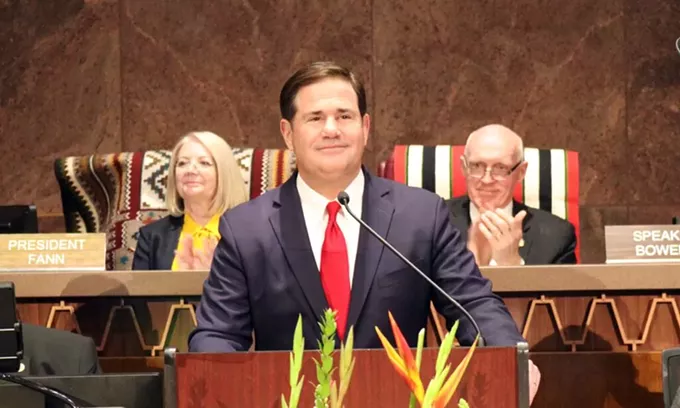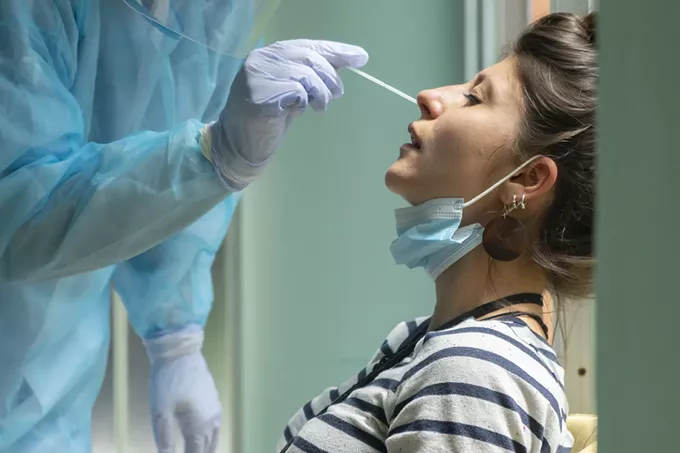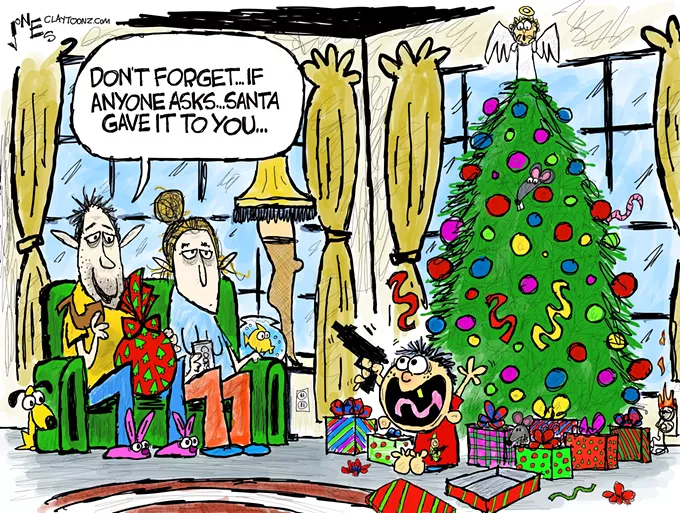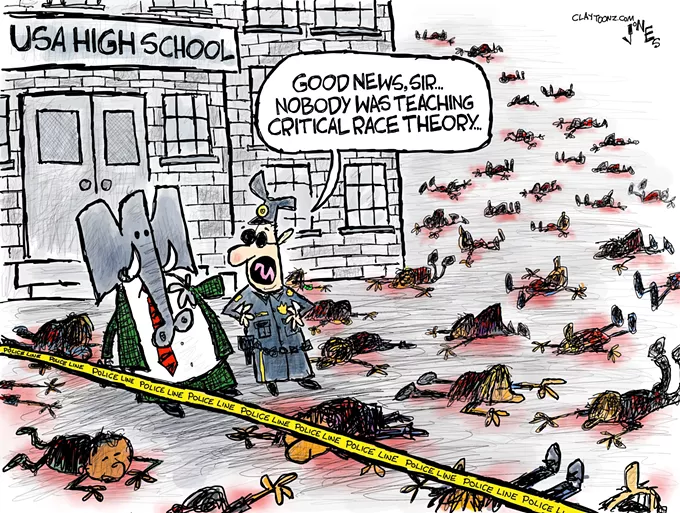Thursday, March 31, 2022
With the stroke of a pen Wednesday, Gov. Doug Ducey made it illegal for Arizona women to seek an abortion after 15 weeks of pregnancy — even if they became pregnant because they were raped.
The legislation, which will go into effect 90 days after the legislative session ends, was modeled after a Mississippi law that the U.S. Supreme Court is currently considering. Under Senate Bill 1164, doctors would be prohibited from performing the procedure, even if the patient was a victim of incest or rape. Doctors in violation face a class 6 felony and revoked license. A class 6 felony comes with fines, probation and possible prison time between months and up to 5 years.
“In Arizona, we know there is immeasurable value in every life — including preborn life. I believe it is each state’s responsibility to protect them,” Ducey wrote in a signing letter.
“I think if you would look at the statistics on what is already happening in our country, you’d find that this is a very reasonable policy,” he said.
While supporters have championed the measure as in defense of children, opponents argue it actually places undue burden on women.
“Banning abortion will do NOTHING to protect babies, but everything to strip Arizonans of their bodily autonomy & self-determination,” tweeted Rep. Athena Salman, D-Tempe.
The ban comes in the wake of Republican attacks on abortion access across the country, as conservatives anticipate the federal protections will be torn down by the U.S. Supreme Court later this year. A 15-week abortion ban in Mississippi is being contested in Dobbs v. Jackson Women’s Health Organization, which observers predict the high court will uphold. Currently, Planned Parenthood v. Casey makes bans earlier than 24 weeks unconstitutional.
Both the bill’s sponsor, Sen. Nancy Barto, R-Phoenix, and Ducey have cited the upcoming Supreme Court case in defending the legislation’s legality. But Democrats in staunch opposition to the measure say its current unconstitutionality opens it up to legal challenges.
“Arizonans won’t stand for this. We’ll see you in court and at the polls,” tweeted Rep. Melody Hernandez, D-Tempe.
Critics say the move is out of step with the opinions of Arizonans and medical professionals.
Planned Parenthood Action Fund, which advocates for reproductive freedom, denounced Ducey’s approval and said it ignores the varied medical situations women could face.
“Medical professionals in Arizona are against this ban. Nobody asked for this. But Arizona politicians — including the governor today — are willfully ignoring both public opinion and science with the sole goal of stripping constituents of their constitutional rights,” said President Alexis McGill Johnson in a statement.
NARAL Pro Choice America, an abortion rights group, said the bill is incongruent with the actual opinions of Arizonans statewide, citing a survey which found 71% of respondents oppose making abortion illegal, and 90% agree that family planning should be left up to individuals, without government interference.
Secretary of State Katie Hobbs echoed this in a statement her office released shortly after Ducey’s, condemning his action.
“With Governor Ducey’s signature, our elected leaders have chosen to turn their backs on the overwhelming majority of Arizonans who support the constitutional right to choose. Make no mistake — stripping away women’s constitutional rights won’t stop women from seeking access to reproductive health care,” Hobbs, who is running as a Democrat to replace Ducey as governor, said.
This article was originally published in the Arizona Mirror, a nonprofit news organization.
Monday, March 7, 2022
Gov. Doug Ducey’s claim that facilities in some Arizona counties are charging victims to process their rape kits is disputed by almost every county, and those advancing the claim refuse to reveal where it’s happening.
On Jan. 11, Ducey announced that some Arizona jurisdictions were charging victims $800 in processing fees in violation of the federal Violence Against Women Act, which guarantees that rape kits are free of cost for sexual assault victims.
Arizona law directs counties in which the assaults occur to cover the costs. The Arizona Mirror contacted all 15 county attorney’s offices in the state, and of the 14 that responded, all said they’d never heard of rape victims being charged fees in their counties. The county attorney for Apache County could not be reached after several requests for comment.
Brian McIntyre, the county attorney for Cochise County, said there was one incident 10 years ago — before he was in office — when a woman was billed for her rape kit at a local hospital emergency room. The matter was resolved by county officials after she notified them that her bill had been sent to collections.
“To my knowledge, that hasn’t happened since,” he said..
Mohave County Attorney Matt Smith said he once heard a rumor that hospitals were using collection agencies to go after victims for forensic exam fees. But in the past 10-15 years, that hasn’t been something he’s been aware of happening in Mohave.
Ducey’s claim appears to have originated with a September 2021 letter sent to the governor’s office from the Comission to Prevent Violence Against Women, which helps develop public policy. The $800 estimate was not included in the letter and interviews with the letter’s authors to find out which jurisdictions the governor was referring to were inconclusive.
After the governor made the allegation in his State of the State address, the Arizona Mirror contacted all 29 facilities in the state that provide forensic exams to rape victims. The 17 that responded to inquiries denied charging victims any fees.
Tuesday, March 1, 2022
Kids in juvie might see their financial load lightened, thanks to new legislation approved by the state House of Representatives that would eliminate the rollover of court fees on them and their families.
The legislation would scrap the court’s ability to charge juvenile delinquents or their parents' fees related to their trial and conviction.
“This doesn’t take away their responsibility to whatever they did. What it does is — it doesn’t push them down further into a hole of financial debt,” Rep. Walt Blackman, a Republican from Snowflake and the sponsor of House Bill 2033, said during a House Judiciary Committee hearing on Jan. 26. Blackman is a longtime proponent of criminal justice reform.
Under existing law, juveniles can be billed for court-appointed attorneys and court-ordered counseling or treatment programs. They may also be forced to pay for food, clothing, shelter, supervision, and medical or mental healthcare costs incurred while in the custody of the Department of Juvenile Corrections. Even foster care, if the judge deems it necessary, is added to the bill.
Thursday, January 20, 2022
As part of a 24th birthday celebration, Cheba Hut is teaming up with the Last Prisoner Project, which is dedicated to cannabis criminal justice reform. The restaurant will donate $1 from every sub it sells today to the Last Prisoner Project and corporate HQ will match all donations.
Given that far too many people remain behind bars thanks to cannabis offenses, this seems like a tasty way to help in the effort to end incarceration for smoking weed.
Cheba Hut is open from 10 a.m. to 10 p.m. today.
Monday, January 17, 2022
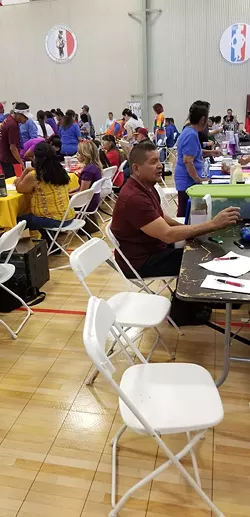
PHOENIX – Selso Villegas knows the criminal justice system well. His daughter has battled a drug addiction for years, so for the past decade, he has cared for his grandchildren, including two grandsons who have been incarcerated. But as an American Indian, Villegas and his family face additional hurdles.
“We were conquered and we were put on reservations, isolated,” said Villegas, executive director of water resources for the Tohono O’odham Nation. “So I think our biggest problem for young men and women is that we were stripped from our social development.”
Villegas’ grandsons are a part of a disproportionately large group of American Indians held in southern Arizona jails. Data from the Safety and Justice Challenge – which is funded by the John D. and Catherine T. MacArthur Foundation – shows that Native Americans are 1.8 times as likely as white Americans to be booked into a Pima County jail.
“Racial bias and racial bias compounded by poverty or economic struggle really make certain communities much more vulnerable to getting involved in and trapped up in the criminal legal system,” said Valena Beety, a law professor at the Sandra Day O’Connor College of Law at Arizona State University.
Villegas blames colonization for the situation Native Americans are in today.
“We were conquered, and we’re put on reservations, isolated,” he said. “So I think our biggest problem for young men and women or men is that we were stripped from our social development.”
Every year in the United States, more than 10 million people are jailed, according to data from the U.S. Department of Justice. The Safety and Justice Institute says about 75% of them are behind bars for nonviolent offenses related to traffic, property, drug or public order offenses. And, since 2000, the Native American jail population nationwide is up 85%, according to the Prison Policy Initiative.
The vast majority of people in jail are awaiting trial, meaning they haven’t been convicted of any crime. And jail time for any reason can have a cascading effect.
“Even three days of being in jail can mean you lose your job,” Beety said. “That can mean you’re abandoning your children legally, so your custody of your children could be in question.”
Wednesday, December 15, 2021
Friday, December 10, 2021
The Arizona Department of Health Services and Yavapai County Community Health Services confirmed Arizona’s first known case of the COVID-19 Omicron variant on Dec. 8.
Although some initial data from the South African Medical Research Council indicates the Omicron variant may have less severe symptoms than previous mutations, health officials advise the public to receive vaccinations or booster shots if they have already gotten vaccinated.
Pfizer-BioNTech released preliminary results from a non-peer-reviewed study showing the Pfizer COVID-19 two-dose vaccination series will somewhat neutralize the omicron variant, but three doses is most effective.
“I think that this finding from Pfizer should be reassuring and should reaffirm to people how important it is for them to get a booster and if they are not vaccinated to please seek vaccination as soon as possible, especially with the holidays coming up,” Pima County Health Department Director Dr. Theresa Cullen said during a Dec. 8 press conference.
As scientists race to understand Omicron, vaccines are the best option to avoid national shutdowns. Cullen said that people who are vaccinated protect themselves, their families and their communities.
“While it is not the only way out of this pandemic, it is an essential component for us to be able to move forward and to start recovering,” Cullen said.



